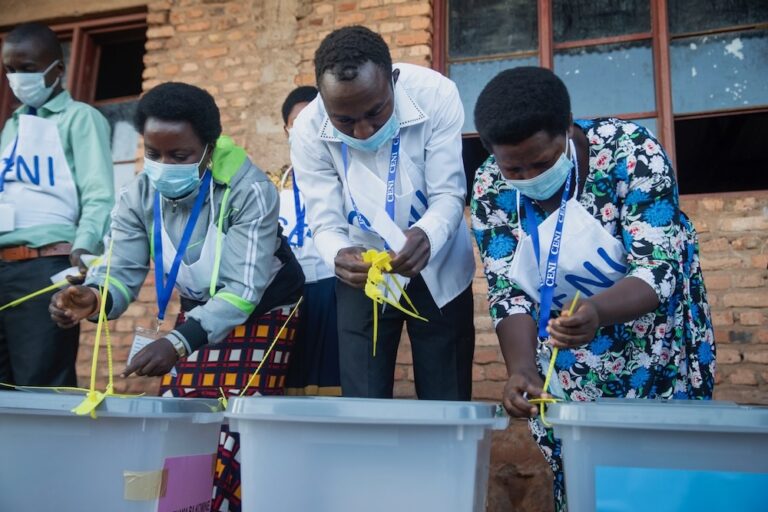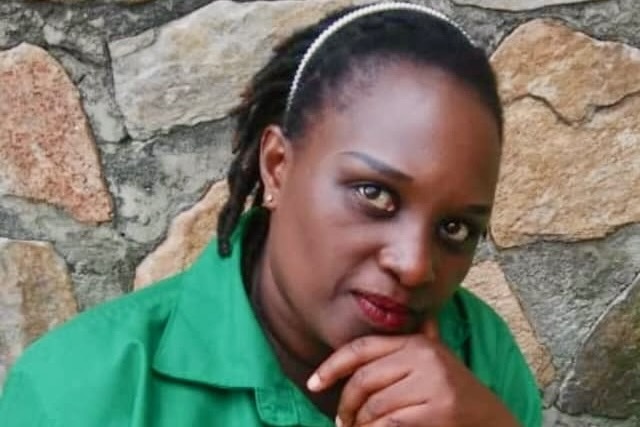This is the first nongovernmental organization to be banned in Burundi, a worrisome development as the country gears up for presidential elections.
Threats and restrictions represent attempt to silence critics
(Human Rights Watch/IFEX) – (Bujumbura, November 25, 2009) – Burundian authorities should immediately retract an ordinance outlawing the Forum for the Strengthening of Civil Society (FORSC), an umbrella organization representing 146 Burundian civil society associations, said Amnesty International, the East and Horn of Africa Human Rights Defenders Project, and Human Rights Watch in a joint statement issued today. The government should also end threats and harassment against civil society activists, the groups said.
The ordinance, signed by Interior Minister Edouard Nduwimana on November 23, 2009, annuls the legal registration of FORSC, citing an alleged technical error in the group’s registration application, which was approved by the same ministry in May 2006. This is the first nongovernmental organization to be banned in Burundi, a worrisome development as the country gears up for presidential elections.
The ban follows several weeks of increasing intimidation, harassment, and threats against civil society activists working on issues of accountability. The week before the ordinance was signed, the forum’s delegate general, Pacifique Nininahazwe, and Pierre Claver Mbonimpa, president of the Association for the Protection of Human Rights and Detained Persons (APRODH), said they were placed under surveillance by the National Intelligence Service and received a series of death threats.
“Burundi’s ban on FORSC appears to have no real legal basis and is a frontal assault on freedom of association,” said Georgette Gagnon, Africa director at Human Rights Watch. “Along with the threats against two highly respected activists, this is a brazen attempt to silence Burundi’s vibrant civil society.”
FORSC, which has united civil society organizations in a number of campaigns around issues ranging from transitional justice to election monitoring, has recently been at the forefront of efforts to ensure accountability for several killings that occurred in 2009. It has been leading a campaign calling for serious investigations into the killings of Ernest Manirumva and Salvator Nsabiriho. Witnesses implicate state agents in the both killings.
Following a statement by Nininahazwe on November 7, in which he called on President Pierre Nkurunziza to react to the murders, Interior Minister Nduwimana summoned FORSC and several other organizations and threatened to “punish” them for their outspokenness. The following week, Nininahazwe and Mbonimpa began to receive death threats. On November 18, eight organizations addressed an open letter to President Nkurunziza, raising concerns about the threats and calling for an end to the harassment of civil society.
“Banning an organization several days after it speaks out against threats – despite the government’s attempts to couch the ban in formal legal terms – raises concerns that the government’s goal is to silence critics,” said Hassan Shire, executive director of the East and Horn of Africa Human Rights Defenders Project. “Rather than abolish civil society groups, it should engage in a productive dialogue with them to improve conditions for all Burundians.”
According to the ordinance, the ban on FORSC is based on the fact that some of its members are registered by the Ministry of Public Works, Labor, and Social Security (such as trade unions), and the Ministry of Justice (such as the Bar Association), rather than the Ministry of Interior, which governs registration of most nongovernmental organizations. However, these groups were members of the forum when the Interior Ministry approved its statute and membership list in 2006.
Burundian lawyers interviewed by Human Rights Watch said that the ordinance has no legal basis. One lawyer pointed out that several collectives, working on HIV/AIDS and economic development, report to different ministries. Passing an ordinance on the basis that diverse associations cannot form legally recognized networks would set a dangerous legal precedent, the lawyer said.
Even under an interpretation of Burundian law that would prohibit forming such networks, an Interior official speaking at a news conference on November 24 could not explain why an error made by the ministry itself should result in banning an organization, rather than efforts to bring it into compliance. Pressed by journalists, the official, Réné Gabriel Simbakeneye, claimed that the ordinance was intended to “suspend” FORSC. He said that when the forum “corrects the mistakes (in its statute), the minister will do it the favor of allowing it to continue its activities.”
Burundian civil society organizations pointed out in a statement on November 24 that the ordinance violates fundamental human rights. Article 22 of the International Covenant on Civil and Political Rights (ICCPR), to which Burundi is a party, states that everyone has the right to freedom of association. The only permissible restrictions are those that are “prescribed by law and are necessary in a democratic society in the interests of national security or public safety, public order, the protection of public health or morals or the protection of the rights and freedoms of others.” None of these restrictions has been used as a justification for banning FORSC.
Human Rights Watch, the East and Horn of Africa Human Rights Defenders Project, and Amnesty International urged the government of Burundi to reverse the ordinance immediately and allow FORSC to continue its operations.
“The Burundian government has a right, under international law, to regulate the formation and activities of civil society organizations,” said Tawanda Hondora, deputy director in the Africa programme of Amnesty International. “But abolishing a group because it questions government practice is a serious human rights violation at this critical time in Burundi’s history.”
BACKGROUND:
FORSC is one of Burundi’s most active organizations. It was founded in 2006 with the mission of “strengthening civil society’s position and visibility in order to effectively contribute to the emergence and consolidation of a state respectful of the rule of law, where peace and prosperity reign.” Its recent activities include coordinating civil society activists to monitor UN-sponsored consultations on transitional justice.
After the killing in April of Ernest Manirumva, vice president of the anti-corruption organization OLUCOME, the Forum initiated the “Justice for Ernest Manirumva” campaign, calling on the government to identify and arrest the perpetrators, whom many civil society organizations suspected of being state agents. The campaign appears to have been one of the main forces that led to the decision by the prosecutor of the republic to disband an inactive government-appointed investigatory commission and replace it, in October, with a new commission that seemed to initiate serious investigations.
In November, FORSC publicly denounced the murder of Salvator Nsabiriho, a young man who was summoned by the Governor of Kayanza province on October 13 regarding a property dispute. According to FORSC and numerous other organizations, Nsabiriho was interrogated and then beaten brutally by police acting on the orders of the governor, Senel Nduwimana. Nsabiriho died of his injuries on November 5 after denouncing the perpetrators to his family and to Burundian human rights activists.
On November 10, the same day that Minister Nduwimana threatened to “punish” FORSC and other civil society organizations, Nininahazwe and Mbonimpa received death threats from individuals linked to the National Intelligence Service. They were told that intelligence agents wanted to kill them because of information they were believed to possess about Manirumva’s murder.


